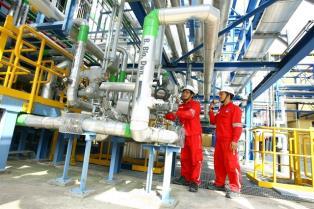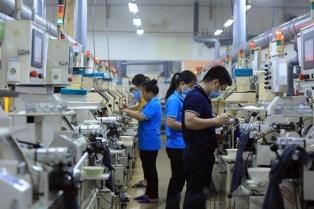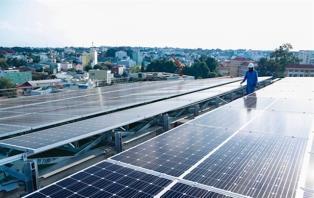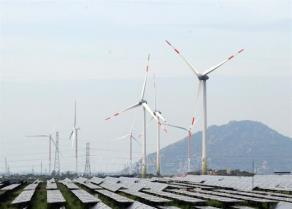A robust framework aligned with the NDC and offering clarity and predictability is essential not only for public and private sector engagement but also for unlocking the economic potential of carbon credits.
By Ly Ly Cao
HÀ NỘI — Việt Nam is taking significant steps toward establishing a comprehensive regulatory framework for international carbon credit trading, demonstrating its commitment to reducing greenhouse gas emissions and addressing the pressing challenges of climate change.
In a consultation workshop organised by the Southeast Asia Energy Transition Partnership in collaboration with the Department of Climate Change, Ministry of Agriculture and Environment, experts gathered to assess the impact of carbon credit trading and the transfer of emission reduction results to international markets.
Việt Nam has identified the development of a carbon market as a pivotal strategy to achieve its greenhouse gas emission reduction targets by 2030. The country has set an ambitious goal of reaching net-zero emissions by 2050, a commitment that aligns with its broader environmental and economic objectives.
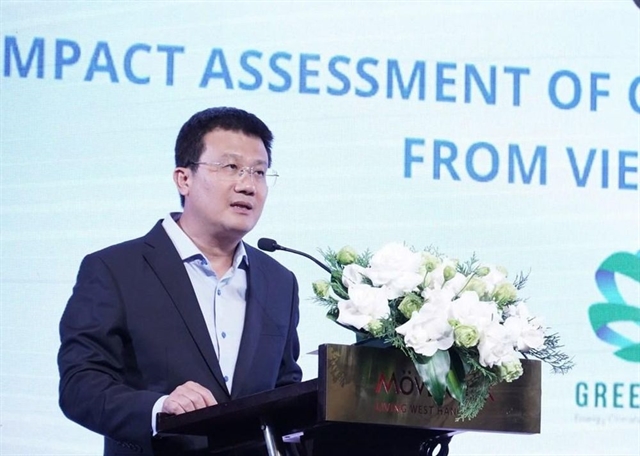
Speaking at the opening ceremony, Nguyễn Tuấn Quang, deputy director of the Department of Climate Change, said the Government is proactively working on the legal framework necessary to support this transformative initiative.
The 2020 Environmental Protection Law includes provisions for establishing and developing a carbon market, marking a significant milestone for Việt Nam.
The Government has already issued Decree No. 06/2022/ND-CP, which sets the groundwork for carbon market operations and is currently being revised under Decree No. 119/2025/ND-CP.
The regulatory framework outlines the operational roadmap for the carbon market, with a pilot phase scheduled to run through 2028 and full implementation planned for 2029.
The establishment of a national registry and trading platform for carbon credits is essential to facilitate robust trading activities.
Central to the proposed regulations is the principle that international carbon credit transactions must prioritise national emission reduction goals.
The Vietnamese Government emphasises that all projects must adhere to the country’s Nationally Determined Contributions (NDCs) under the Paris Agreement.
This ensures that the quality of carbon credits produced meets international standards, thereby enhancing the credibility of Việt Nam's commitments on the global stage.
Revenue generated from these transactions will be managed in accordance with Vietnam's financial laws, ensuring transparency and accountability.
One of the critical aspects of the regulation is the stipulation that when Việt Nam transfers emission reduction results to international partners, it must adjust its own emission reports to accurately reflect this transfer.
This mechanism is vital for ensuring transparency and preventing double counting, which could undermine the integrity of Việt Nam’s emission reduction commitments under the Paris Agreement.
The consultation workshop also highlighted the importance of assessing various scenarios for credit trading.
Nguyễn Hồng Loan, team leader and climate policy expert at GreenCIC, evaluated nine potential frameworks that focus on the eligibility of activities for international transfer and the retention rates of emission reductions necessary to meet NDC targets.
Scenarios range from limiting trades to a select number of mitigation measures to significantly expanding eligibility criteria.
For instance, one scenario, labelled S20, would allow the trading of credits from only 20 selected mitigation measures that fully contribute to the NDC targets, while another scenario, S56, would expand eligibility to 56 measures, including both conditional and unconditional contributions.
This analysis is crucial for developing a trading environment that balances economic opportunities with the need for sustainable environmental practices.
Economic benefits from carbon credit trading have the potential to be substantial.
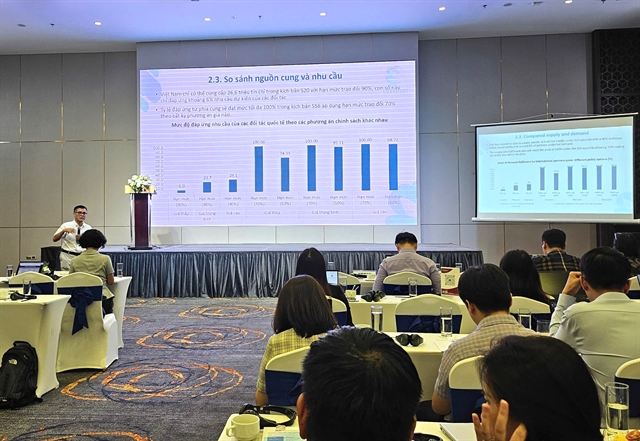
Preliminary assessments suggest that the expanded eligibility scenario could contribute an average of 0.43 per cent annually to Việt Nam’s GDP from 2025 to 2030, said Hồ Công Hoà, impact assessment expert at the Academy of Policy and Development.
This growth could foster increased investments, higher consumer spending, and new job opportunities across various sectors. Such promising figures underscore the importance of a well-regulated carbon market in supporting Việt Nam’s economic development while addressing environmental concerns.
Experts at the workshop recommended a cautious approach to carbon credit trading, suggesting an initial trading cap of 50 per cent.
This cap would help manage risks while still enabling Việt Nam to contribute to its NDC goals.
As domestic capacity for emission reductions strengthens and trust in meeting unconditional targets grows, this cap could be gradually increased to 70 per cent.
This incremental approach aims to maximise the benefits of international support while ensuring that the country meets its domestic climate obligations.
A reasonable transaction fee (around 2 per cent) should be applied to generate state revenue from carbon market activities. This revenue should be reinvested in hard-to-abate sectors such as agriculture and forestry to ensure equity and enhance overall mitigation effectiveness.
Policies should be designed to encourage enterprises to invest in credit-generating measures in priority sectors, thereby maximising NDC contributions, mitigating market volatility and enhancing the competitiveness of Việt Nam’s carbon credits in international markets.
A robust framework aligned with the NDC and offering clarity and predictability is essential not only for public and private sector engagement but also for unlocking the economic potential of carbon credits and shaping the pricing of future Internationally Transferred Mitigation Outcomes (ITMOs) under Article 6, said Roxanne Tan, international carbon market expert at South Pole, in an interview with Việt Nam News. — BIZHUB/VNS


